News
Peter Obi not qualified to contest presidential poll – APC tells tribunal
Published
2 years agoon
By
News Editor
The All Progressives Congress (APC), has prayed the Presidential Election Petition Court (PEPC) in Abuja to dismiss the petition filed by the Labour Party (LP) and its Presidential Candidate, Mr Peter Obi, against the emergence of Sen. Bola Tinubu as president-elect in the February 25 election.
The APC, the 4th respondent, urged the PEPC to reject the petition in its notice of preliminary objection marked: CA/PEPC/03/2023 and filed at PEPC’s Secretariat on Monday night by Thomas Ojo, a member of the party’s legal team led by Lateef Fagbemi, SAN, in Abuja.
The party asked the tribunal to dismiss the petition with substantial cost on the grounds that it lacked merit and was frivolous.
The News Agency of Nigeria (NAN) reports that Obi, the 1st petitioner, and LP, the 2nd petitioner, had sued the Independent National Electoral Commission (INEC), Tinubu, Sen. Kashim Shettima and APC as 1st to 4th respondents, respectively.
The petitioners are seeking the nullification of the election victory of Tinubu and Shettima in the Feb. 25 presidential poll.
While former Vice-President Atiku Abubakar of the Peoples Democratic Party (PDP) came second with 6,984,520 votes in the election, Obi came third with 6,101,533 votes.
Abubakar and PDP are also challenging the outcome of the poll.
However, in the petition marked: CA/PEPC/03/2023 filed by Obi and LP’s lead counsel, Livy Ozoukwu, they contended that Tinubu “was not duly elected by a majority of the lawful votes cast at the time of the election.”
The petitioners claimed there was rigging in 11 states, adding that they would demonstrate this in the declaration of results based on the uploaded results.
Obi and LP said INEC violated its own regulations when it announced the result despite the fact that at the time of the announcement, the totality of the polling unit results had yet to be fully scanned, uploaded and transmitted electronically as required by the Electoral Act.
Among other prayers, the petitioners urged the tribunal to “determine that, at the time of the presidential election held on February 25, 2023, the 2nd and 3rd respondents (Tinubu and Shettima) were not qualified to contest the election.
“That it be determined that all the votes recorded for the 2nd respondent in the election are wasted votes, owing to the non-qualification of the 2nd and 3rd respondents.
“That it is determined that on the basis of the remaining votes (after discountenancing the votes credited to the 2nd respondent), the 1st petitioner (Obi) scored a majority of the lawful votes cast at the election and had not less than 25 per cent of the votes cast in each of at least two-thirds of the states of the federation and the FCT and satisfied the constitutional requirements to be declared the winner of the February 25 presidential election.
“That it be determined that the 2nd respondent (Tinubu), having failed to score one-quarter of the votes cast at the presidential election in the FCT, was not entitled to be declared and returned as the winner of the presidential election held on February 25.”
Responding, the APC prayed the court to dismiss the suit on the ground that Obi, the 1st petitioner, lacked requisite locus standi to institute the petition because he was not a member of LP at least 30 days before the party’s presidential primary to be validly sponsored by the party.
It said: “The 1st petitioner (Obi) was a member of PDP until May 24, 2022.
“1st petitioner was screened as a presidential aspirant of the PDP in Apni 2022.
“1st petitioner participated and was cleared to contest the presidential election while being a member of the PDP.
“1st petitioner purportedly resigned his membership of PDP on May 24, 2022, to purportedly join the 2nd petitioner (Labour Party) on May 27, 2022.
“2nd petitioner conducted its presidential primary on May 30, 2022, which purportedly produced 1st petitioner as its candidate, which time contravened Section 77(3) of the Electoral Act for him to contest the primary election as a member of the 2nd petitioner.”
The party argued that Obi was not a member of LP at the time of his alleged sponsorship.
The APC argued that “by the mandatory provisions of Section 77 (1) (2) and (3) of the Electoral Act 2022, a political party shall maintain a register and shall make the such register available to INEC not later than 30 days before the date fixed for the party primaries, congresses and convention.”
It stated further that all the PDP’s presidential candidates were screened on April 29, 2022, an exercise in which Obi participated and was cleared to contest while being a member of the party.
It argued that the petition was incompetent since Obi’s name could not have been in LP’s register made available to INEC at the time he joined the party.
The APC equally argued that the petition was improperly constituted, having failed to join Atiku Abubakar and PDP, which were necessary parties to be affected by the reliefs sought.
“By Paragraph 17 of the petition, the petitioners, on their own, stated that Alhaji Atiku Abubakar came second in the presidential election with 6,984,520 votes as against the petitioners who came third with 6,101,533 votes;
“At Paragraph 102 (ii) of the petition, the petitioners urged the tribunal to determine that the 1st petitioner scored the majority of lawful votes without joining Alhaji Atiku Abubakar in the petition.
“For the tribunal to grant prayer (iii) of the petitioners, the tribunal must have set aside the scores and election of Alhaji Atiku Abubakar.
“Alhaji Atiku Abubakar must be heard before his votes can be discountenanced by the tribunal,” it said.
The party, therefore, argued that the tribunal lacked the requisite jurisdiction to entertain pre-election complaints embedded in the petition as presently constituted, among other arguments.
The APC urged the tribunal to dismiss the petition with substantial cost as the same was devoid of any merit and founded on frivolity.
The News Agency of Nigeria (NAN) reports that Obi, the 1st petitioner, and LP, the 2nd petitioner, had sued the Independent National Electoral Commission (INEC), Tinubu, Sen. Kashim Shettima and APC as 1st to 4th respondents, respectively.
The petitioners are seeking the nullification of the election victory of Tinubu and Shettima in the Feb. 25 presidential poll.
While former Vice-President Atiku Abubakar of the Peoples Democratic Party (PDP) came second with 6,984,520 votes in the election, Obi came third with 6,101,533 votes.
Abubakar and PDP are also challenging the outcome of the poll.
However, in the petition marked: CA/PEPC/03/2023 filed by Obi and LP’s lead counsel, Livy Ozoukwu, they contended that Tinubu “was not duly elected by a majority of the lawful votes cast at the time of the election.”
The petitioners claimed there was rigging in 11 states, adding that they would demonstrate this in the declaration of results based on the uploaded results.
Obi and LP said INEC violated its own regulations when it announced the result despite the fact that at the time of the announcement, the totality of the polling unit results had yet to be fully scanned, uploaded and transmitted electronically as required by the Electoral Act.
Among other prayers, the petitioners urged the tribunal to “determine that, at the time of the presidential election held on February 25, 2023, the 2nd and 3rd respondents (Tinubu and Shettima) were not qualified to contest the election.
“That it be determined that all the votes recorded for the 2nd respondent in the election are wasted votes, owing to the non-qualification of the 2nd and 3rd respondents.
“That it is determined that on the basis of the remaining votes (after discountenancing the votes credited to the 2nd respondent), the 1st petitioner (Obi) scored a majority of the lawful votes cast at the election and had not less than 25 per cent of the votes cast in each of at least two-thirds of the states of the federation and the FCT and satisfied the constitutional requirements to be declared the winner of the February 25 presidential election.
“That it be determined that the 2nd respondent (Tinubu), having failed to score one-quarter of the votes cast at the presidential election in the FCT, was not entitled to be declared and returned as the winner of the presidential election held on February 25.”
Responding, the APC prayed the court to dismiss the suit on the ground that Obi, the 1st petitioner, lacked requisite locus standi to institute the petition because he was not a member of LP at least 30 days before the party’s presidential primary to be validly sponsored by the party.
It said: “The 1st petitioner (Obi) was a member of PDP until May 24, 2022.
“1st petitioner was screened as a presidential aspirant of the PDP in Apni 2022.
“1st petitioner participated and was cleared to contest the presidential election while being a member of the PDP.
“1st petitioner purportedly resigned his membership of PDP on May 24, 2022, to purportedly join the 2nd petitioner (Labour Party) on May 27, 2022.
“2nd petitioner conducted its presidential primary on May 30, 2022, which purportedly produced 1st petitioner as its candidate, which time contravened Section 77(3) of the Electoral Act for him to contest the primary election as a member of the 2nd petitioner.”
The party argued that Obi was not a member of LP at the time of his alleged sponsorship.
The APC argued that “by the mandatory provisions of Section 77 (1) (2) and (3) of the Electoral Act 2022, a political party shall maintain a register and shall make the such register available to INEC not later than 30 days before the date fixed for the party primaries, congresses and convention.”
It stated further that all the PDP’s presidential candidates were screened on April 29, 2022, an exercise in which Obi participated and was cleared to contest while being a member of the party.
It argued that the petition was incompetent since Obi’s name could not have been in LP’s register made available to INEC at the time he joined the party.
The APC equally argued that the petition was improperly constituted, having failed to join Atiku Abubakar and PDP, which were necessary parties to be affected by the reliefs sought.
“By Paragraph 17 of the petition, the petitioners, on their own, stated that Alhaji Atiku Abubakar came second in the presidential election with 6,984,520 votes as against the petitioners who came third with 6,101,533 votes;
“At Paragraph 102 (ii) of the petition, the petitioners urged the tribunal to determine that the 1st petitioner scored the majority of lawful votes without joining Alhaji Atiku Abubakar in the petition.
“For the tribunal to grant prayer (iii) of the petitioners, the tribunal must have set aside the scores and election of Alhaji Atiku Abubakar.
“Alhaji Atiku Abubakar must be heard before his votes can be discountenanced by the tribunal,” it said.
The party, therefore, argued that the tribunal lacked the requisite jurisdiction to entertain pre-election complaints embedded in the petition as presently constituted, among other arguments.
The APC urged the tribunal to dismiss the petition with substantial cost as the same was devoid of any merit and founded on frivolity.
You may like
-
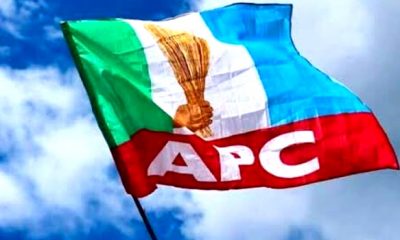

APC Picks Ondo Gov Candidate Apr 25, Pegs Form At ₦50m
-
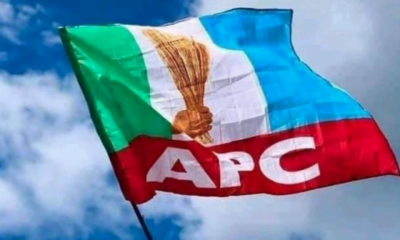

Gov Poll: Kogi APC Demands Arrest, Prosecution Of PDP’s Melaye For Alleged Cyber Crime
-


Uzodimma, Sylva, Ododo Receive APC Flags Few Days To Gov Polls
-
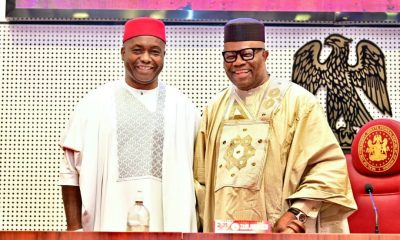

APC Senators increase to 60 as Ifeanyi Ubah defects
-
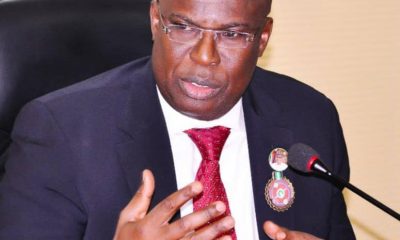

Court Sacks APC Governorship Candidate In Bayelsa
-
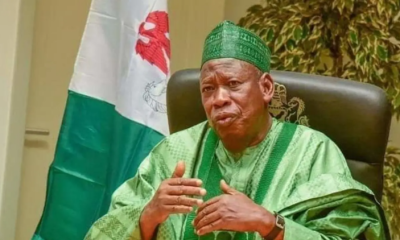

Guber Poll: I’ll Hit The Ground Running As APC Chairman – Ganduje
News
Natasha Not Suspended for Sexual Harassment Allegation, But Violation of Standing Orders, Senate Clarifies
Published
2 days agoon
March 8, 2025By
News Editor
The Senate has faulted pervasive claims that one of its members representing Kogi Central, Senator Natasha Akpoti-Uduaghan was suspended for accusing the President of the Senate, Senator Godswill Akpabio of sexual harassment.
Rather, the upper chamber clarified that Akpoti-Uduaghan was suspended specifically due to her flagrant disobedience to Sections 6.1 and 6.2 of the Senate Standing Orders 2023 (As Amended) and her unparliamentary behaviour during its plenaries and proceedings.
The Leader of the Senate, Senator Opeyemi Bamidele made these clarifications in a three-page statement released on Saturday amid the deliberate misinformation and false narratives being circulated by certain media organisations.
Contingent on the report of its Committee on Ethics and Privileges, the Senate had suspended Akpoti-Uduaghan for six months over alleged misconduct and refusal to comply with its sitting arrangement during the plenary.
The Senate upheld her suspension with a proviso that if Akpoti-Uduaghan “submits a written apology, the leadership of the chamber may consider lifting the suspension before the six-month period expires.”
Rather than submitting to the Authority of the Senate, Akpoti-Uduaghan had been misinforming the unsuspecting public that she was suspended because she accused the senate president of sexual harassment.
In a statement he released on Saturday, however, Bamidele clarified that the disciplinary action against Akpoti-Uduaghan was unequivocally a response to her repeated violations of legislative decorum.
In the same vein, the statement further clarified that Akpoti-Uduaghan’s petition on sexual harassment failed to meet the clear and established procedural requirements for submitting petitions to the Senate.
The statement reads in part: “It has come to the attention of the Senate that some media reports are attempting to falsely suggest that Akpoti-Uduaghan’s suspension was due to allegations of sexual harassment.
“This is completely untrue, misleading, and a calculated attempt to distort the facts. If Akpoti-Uduaghan had strictly followed our guiding principles, the Senate would have treated her petition based on merit in line with its practice. But she never obeyed the established practices of the institution where she was serving,” the statement said.
Specifically, the statement revealed that Akpoti-Uduaghan’s suspension was “a decision of the Committee of the Whole Senate, following the submission of a report by the Chairman of the Senate Committee on Ethics and Privileges.”
The statement noted that the report found Akpoti-Uduaghan guilty of violating Sections 6.1 and 6.2 of the Senate Standing Orders 2023 (As Amended) and recommended her immediate suspension.
As established in the findings of the Senate Committee on Ethics and Privileges, the statement pointed out that the disciplinary action was “a response to Akpoti-Uduaghan’s repeated violations of legislative decorum stated as follows:
” Refusing to sit in her assigned seat during plenary on 25th February 2025, despite multiple pleas from the Minority Leader and other ranking Senators—an act of open defiance and disorderly conduct.
“Speaking without being recognized by the presiding officer, in clear violation of parliamentary practices and procedures on 25th February 2025.
“Engaging in unruly and disruptive behavior, obstructing the orderly conduct of Senate proceedings. Making abusive and disrespectful remarks against the leadership of the Senate.
“Defying and refusing to comply with the summons of the Senate Committee on Ethics and Privileges mandated to investigate cases of misconduct,” the statement highlighted violations of the Senate Standing Order 2023 (As Amended) by Akpoti-Uduaghan.
The statement, therefore, noted that these actions represented a direct challenge to the Authority of the Senate and a violation of the Senate Standing Orders 2023 (As Amended) that govern the business of the Senate and the conduct of all its members without any exception.
The statement noted that the disciplinary measure was imperative, necessary and justified to restore order and uphold the integrity of the Senate as the country’s foremost democratic institution.
“Contrary to the false claims being circulated, Akpoti-Uduaghan was not suspended for making any sexual harassment or for submitting a petition. Her petition was rightfully discountenanced because it failed to meet the clear and established procedural requirements for submitting petitions to the Senate.
” The rules of the Senate apply to all members without exception, and no petition—regardless of its subject—can be considered if it does not follow due process. To suggest that her suspension was linked to her petition is not only a distortion of facts but an intentional and malicious attempt to mislead the public,” the statement noted.
While thanking some media organisations for their reporting, the statement urged the media not to distort facts to suit a false narrative expressing dissatisfaction with an attempt to politicise a disciplinary action that was strictly based on clear violations of Senate Standing Orders 2023 (As Amended).
The statement said: ” This coordinated misinformation campaign is nothing more than an attempt to politicise a disciplinary action that was strictly based on clear violations of Senate Standing Orders 2023 (As Amended).
“It is reckless, misleading, and a disservice to the people of the Federal Republic of Nigeria, who deserve truthful and factual reporting. We, therefore, urge all foreign correspondents and responsible media houses to correct these misrepresentations and avoid propagating falsehoods that undermine the integrity of Nigeria’s legislative process.”
News
Bill To End HND, BSc Dichotomy Scales Second Reading In The House
Published
5 days agoon
March 5, 2025By
News Editor
A bill to abolish the dichotomy and discrimination between Bachelor’s Degree holders and Higher National Diploma (HND) holders has scaled second reading in the House of Representatives.
According to the Speaker, Tajudeen Abbas, the bill sought to replace HND with Bachelor of Tech so that graduates of polytechnic would be able to compete favourably with other university graduates.
The bill, which was sponsored by a member, Fuad Laguda from Lagos State, also emphasised the importance of technical education.
Speaker Abbas said the position taken by all boards of polytechnics in Nigeria is “the abolition of HND and in place of it to have Bachelor of Technology so that at least graduates of polytechnics will be able to compete with those from universities”.
“At the same time, they are calling for hybrid supervision where the degree component of the polytechnic education will be handled by the NUC (National Universities Commission) while the national diploma will continue to be handled by the NBTE (National Board for Technical Education).
“Because of the degree component of this amendment, they felt that the qualification for being rector should also be upgraded to a Ph.D holder at the minimum since you will now be talking about degree programmes, it is only proper for such kind of establishment to have a Ph.D holder as the head of the institution,” he said.
Abbas subjected the bill to a voice vote and the lawmakers approved it to scale second reading.
News
Tax Reform Bills: Senate To Consider Viable Opinions Of Stakeholders
Published
2 weeks agoon
February 25, 2025By
News Editor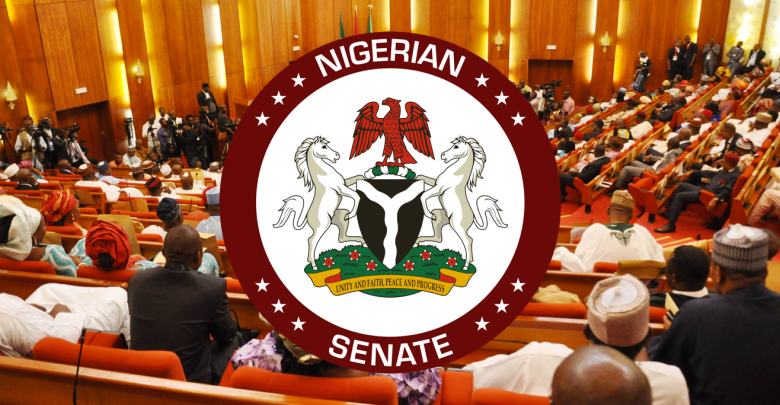
The chairman, Senate committee on Finance, Senator Sani Musa, says the Senate will consider viable opinions of all stakeholders in the passage of current Tax Reform Bills .
Senator Musa who stated this during an interview with newsmen in Abuja emphasized the need for Nigerians to be patient for a tax regime that would be beneficial to all and sundry.
He explained that the red chamber would evolve a legislation that is workable in line with international best practices.
Senator Musa told newsmen that president TINUBU needs one trillion dollar economy adding that the proposed Tax regime would outlive every individual including the lawmakers.
Latest News
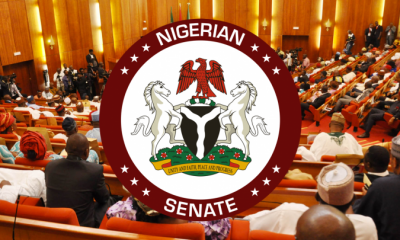

Natasha Not Suspended for Sexual Harassment Allegation, But Violation of Standing Orders, Senate Clarifies
ShareThe Senate has faulted pervasive claims that one of its members representing Kogi Central, Senator Natasha Akpoti-Uduaghan was suspended for...


Nigerian Christians Begin Lent With Ash Wednesday
ShareNigerian Christians have joined their counterparts around the world to celebrate Ash Wednesday which officially heralds the commencement of the...


Bill To End HND, BSc Dichotomy Scales Second Reading In The House
ShareA bill to abolish the dichotomy and discrimination between Bachelor’s Degree holders and Higher National Diploma (HND) holders has scaled...
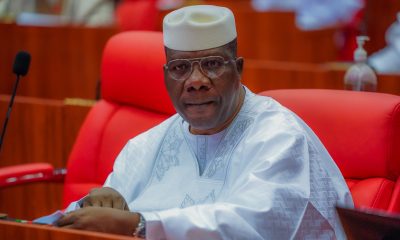

N’Assembly Positioning Nigeria For One Trillion Dollar Economy by 2030 – Bamidele
ShareThe Leader of the Senate, Senator Opeyemi Bamidele on Tuesday reeled out the accomplishments of the 10th National Assembly, saying...
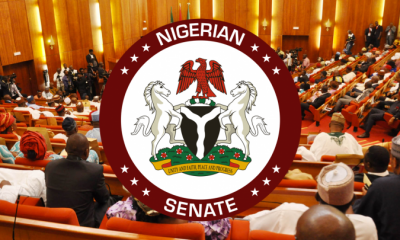

Tax Reform Bills: Senate To Consider Viable Opinions Of Stakeholders
ShareThe chairman, Senate committee on Finance, Senator Sani Musa, says the Senate will consider viable opinions of all stakeholders in...
